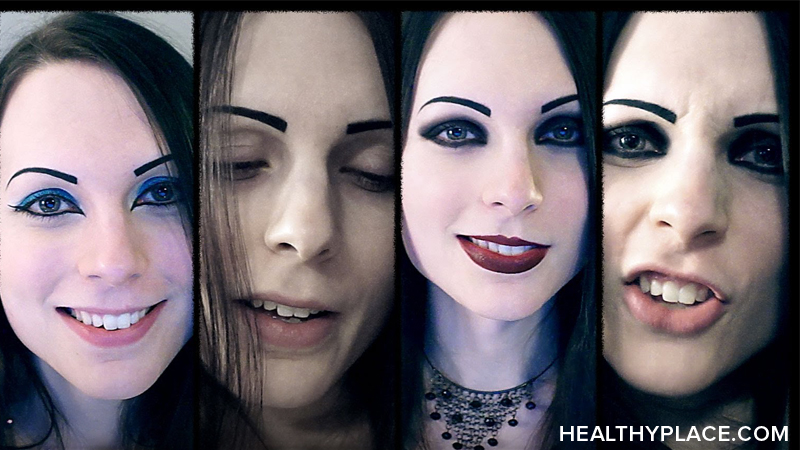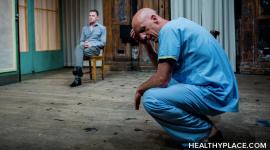Schizoaffective Disorder: Life on a Roller Coaster

Nullum magnum ingenium sine mixtura dementiae fuit. (There is no great genius without madness.)
-- Seneca
When I don't feel like going to the trouble to explain what living with schizoaffective disorder means, I commonly say that I'm manic-depressive rather than schizophrenic because the manic-depressive (or bipolar) symptoms are more prevalent for me. But I experience schizophrenic symptoms as well.
Manic depressives experience alternating moods of depression and euphoria. There can (blessedly) be periods of relative normalcy in between. There is a somewhat regular time period to each person's cycle, but this varies dramatically from person to person, ranging from cycling every day for the "rapid cyclers" to alternating moods about every year for me.
The symptoms tend to come and go; it is possible to live in peace without any treatment sometimes, even for years. But the symptoms have a way of striking again with an overwhelming suddenness. If left untreated a phenomenon known as "kindling" occurs, in which the cycles happen more rapidly and more severely, with the damage eventually becoming permanent.
(I had lived successfully without medication for quite some time through my late 20's, but a devastating manic episode that struck during graduate school at UCSC, followed by a profound depression, made me decide to go back on medication and stay with it, even when I was feeling well. I realized that even though I might feel fine for a long time, staying on medication was the only way to avoid being caught by surprise.)
You may find it odd that euphoria would be referred to as a symptom of mental illness, but it is unmistakably so. Mania is not the same as simple happiness. It can have a pleasant feel to it, but the person who is experiencing mania is not experiencing reality.
Mild mania is known as hypomania and usually does feel quite pleasant and can be fairly easy to live with. One has boundless energy, feels little need to sleep, is creatively inspired, talkative and is often taken to be an unusually attractive person.
Creativity and Manic Depression
Manic depressives are usually intelligent and very creative people. Many manic depressives actually lead very successful lives, if they are able to overcome or avoid the illness' devastating effects - a nurse in Santa Cruz' Dominican Hospital described it to me as "a class illness".
In Touched with Fire, Kay Redfield Jamison explores the relationship between creativity and manic depression and gives biographies of many manic-depressive poets and artists throughout history. Jamison is a noted authority on manic depression, not just because of her academic studies and clinical practice, as she explains in her autobiography An Unquiet Mind, she is manic-depressive herself.
I have a bachelor's degree in Physics, and have been an avid amateur telescope maker for much of my life; this led to my Astronomy studies at Caltech. I taught myself to play piano, enjoy photography, and am quite good at drawing and even do a little painting. I have worked as a programmer for fifteen years (also mostly self-taught), own my own software consulting business, own a nice home in the Maine woods, and am happily married to a wonderful woman who is very well aware of my condition.
I like to write too. Other K5 articles I have written include Is This the America I Love?, ARM Assembly Code Optimization? and (under my previous username) Musings on Good C++ Style.
You wouldn't think that I have spent so many years living in such misery, or that it is something I still have to deal with.
Full-blown mania is frightening and most unpleasant. It is a psychotic state. My experience of it is that I can't hold any particular train of thought for more than a few seconds. I can't speak in complete sentences.
My Experience with Schizophrenic and Bipolar Symptoms
My schizophrenic symptoms get a lot worse when I am manic. Most notably I get profoundly paranoid. Sometimes I hallucinate.
(At the time I was diagnosed, it was not thought that manic depressives ever hallucinated, so my diagnosis of schizoaffective disorder was based on the fact that I was hearing voices while I was manic. Since then, it has become accepted that mania can cause hallucinations. However, I believe my diagnosis to be correct based on the current Diagnostic and Statistical Manual criterion that schizoaffectives experience schizophrenic symptoms even during times they are not experiencing bipolar symptoms. I can still hallucinate or get paranoid when my mood is otherwise normal.)
Mania is not always accompanied by euphoria. There can also be dysphoria, in which one feels irritable, angry and suspicious. My last major manic episode (in the Spring of 1994) was a dysphoric one.
I go for days without sleeping when I am manic. At first, I feel that I don't need to sleep so I just stay up and enjoy the extra time in my day. Eventually, I feel desperate to sleep but I cannot. The human brain cannot function for an extended period of time without sleep, and sleep deprivation tends to be stimulating to manic depressives, so going without sleep creates a vicious cycle that might only be broken by a stay in a psychiatric hospital.
Going a long time without sleeping can cause some odd mental states. For example, there have been times when I lay down to try to rest and started dreaming, but did not fall asleep. I could see and hear everything around me, but there was, well, extra stuff going on. One time, I got up to take a shower while dreaming, hoping that it might relax me enough that I could fall asleep.
In general, I've had the fortune to have a lot of really odd experiences. Another thing that can happen to me is that I might be unable to distinguish between being awake and asleep, or to be unable to distinguish memories of dreams from memories of things that really happened. There are several periods of my life for which my memories are a confusing jumble.
Fortunately, I have only been manic a few times; I think five or six times. I have always found the experiences devastating.
I get hypomanic about once a year. It usually lasts for a couple of weeks. Usually, it subsides, but on rare occasions escalates into mania. (However, I have never become manic when I was taking my medication regularly. The treatment is not so effective for everyone, but at least that much works well for me.)
next: Melancholia
APA Reference
Staff, H.
(2007, March 6). Schizoaffective Disorder: Life on a Roller Coaster, HealthyPlace. Retrieved
on 2026, January 15 from https://www.healthyplace.com/thought-disorders/living-with-schizoaffective-disorder/schizoaffective-disorder-life-on-a-roller-coaster



